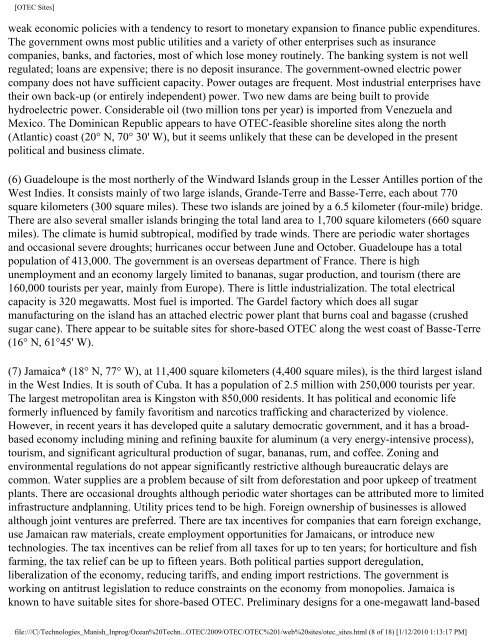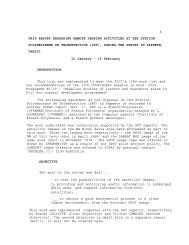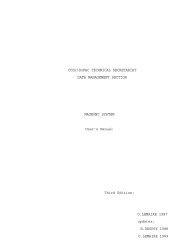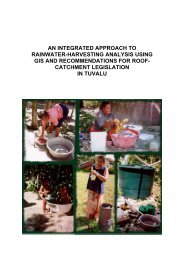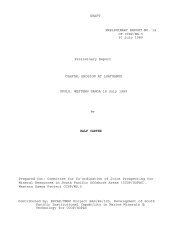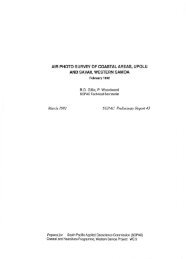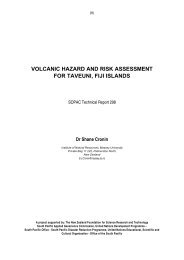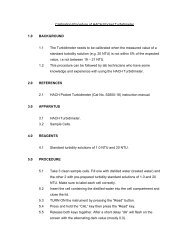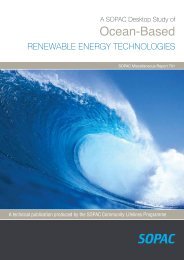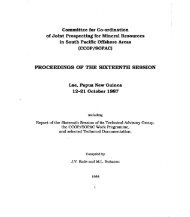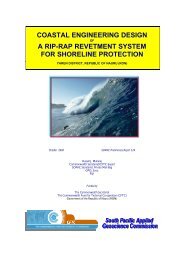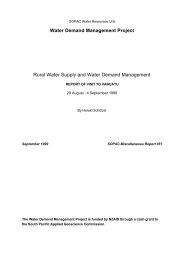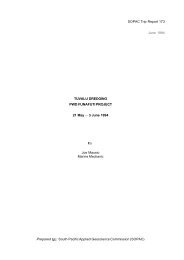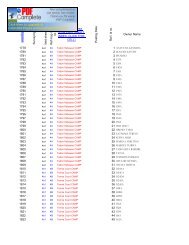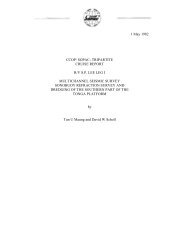OTEC Site Criteria - Up To
OTEC Site Criteria - Up To
OTEC Site Criteria - Up To
You also want an ePaper? Increase the reach of your titles
YUMPU automatically turns print PDFs into web optimized ePapers that Google loves.
[<strong>OTEC</strong> <strong>Site</strong>s]<br />
weak economic policies with a tendency to resort to monetary expansion to finance public expenditures.<br />
The government owns most public utilities and a variety of other enterprises such as insurance<br />
companies, banks, and factories, most of which lose money routinely. The banking system is not well<br />
regulated; loans are expensive; there is no deposit insurance. The government-owned electric power<br />
company does not have sufficient capacity. Power outages are frequent. Most industrial enterprises have<br />
their own back-up (or entirely independent) power. Two new dams are being built to provide<br />
hydroelectric power. Considerable oil (two million tons per year) is imported from Venezuela and<br />
Mexico. The Dominican Republic appears to have <strong>OTEC</strong>-feasible shoreline sites along the north<br />
(Atlantic) coast (20° N, 70° 30' W), but it seems unlikely that these can be developed in the present<br />
political and business climate.<br />
(6) Guadeloupe is the most northerly of the Windward Islands group in the Lesser Antilles portion of the<br />
West Indies. It consists mainly of two large islands, Grande-Terre and Basse-Terre, each about 770<br />
square kilometers (300 square miles). These two islands are joined by a 6.5 kilometer (four-mile) bridge.<br />
There are also several smaller islands bringing the total land area to 1,700 square kilometers (660 square<br />
miles). The climate is humid subtropical, modified by trade winds. There are periodic water shortages<br />
and occasional severe droughts; hurricanes occur between June and October. Guadeloupe has a total<br />
population of 413,000. The government is an overseas department of France. There is high<br />
unemployment and an economy largely limited to bananas, sugar production, and tourism (there are<br />
160,000 tourists per year, mainly from Europe). There is little industrialization. The total electrical<br />
capacity is 320 megawatts. Most fuel is imported. The Gardel factory which does all sugar<br />
manufacturing on the island has an attached electric power plant that burns coal and bagasse (crushed<br />
sugar cane). There appear to be suitable sites for shore-based <strong>OTEC</strong> along the west coast of Basse-Terre<br />
(16° N, 61°45' W).<br />
(7) Jamaica* (18° N, 77° W), at 11,400 square kilometers (4,400 square miles), is the third largest island<br />
in the West Indies. It is south of Cuba. It has a population of 2.5 million with 250,000 tourists per year.<br />
The largest metropolitan area is Kingston with 850,000 residents. It has political and economic life<br />
formerly influenced by family favoritism and narcotics trafficking and characterized by violence.<br />
However, in recent years it has developed quite a salutary democratic government, and it has a broadbased<br />
economy including mining and refining bauxite for aluminum (a very energy-intensive process),<br />
tourism, and significant agricultural production of sugar, bananas, rum, and coffee. Zoning and<br />
environmental regulations do not appear significantly restrictive although bureaucratic delays are<br />
common. Water supplies are a problem because of silt from deforestation and poor upkeep of treatment<br />
plants. There are occasional droughts although periodic water shortages can be attributed more to limited<br />
infrastructure andplanning. Utility prices tend to be high. Foreign ownership of businesses is allowed<br />
although joint ventures are preferred. There are tax incentives for companies that earn foreign exchange,<br />
use Jamaican raw materials, create employment opportunities for Jamaicans, or introduce new<br />
technologies. The tax incentives can be relief from all taxes for up to ten years; for horticulture and fish<br />
farming, the tax relief can be up to fifteen years. Both political parties support deregulation,<br />
liberalization of the economy, reducing tariffs, and ending import restrictions. The government is<br />
working on antitrust legislation to reduce constraints on the economy from monopolies. Jamaica is<br />
known to have suitable sites for shore-based <strong>OTEC</strong>. Preliminary designs for a one-megawatt land-based<br />
file:///C|/Technologies_Manish_Inprog/Ocean%20Techn...<strong>OTEC</strong>/2009/<strong>OTEC</strong>/<strong>OTEC</strong>%201/web%20sites/otec_sites.html (8 of 18) [1/12/2010 1:13:17 PM]


